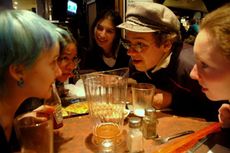Linguistics
Linguistics was originally a form of torture practised upon prisoners languishing in a dungeon (indeed, the word linguistics derives from the verb languish); the method of torture was to continuously recite Oscar Wilde quotations at the prisoner for hours on end. In more recent times, however, linguistics has evolved into the scientific study of language as only Oscar Wilde could speak it. According to an ancient prophecy, exactly one of the quotations attributed to Oscar Wilde on Uncyclopedia is not actually genuine, and whoever succeeds in identifying it will be granted eternal life and supernatural powers (or something like that). Finding this incorrectly attributed quotation is the holy grail of all modern linguistics. Someone who engages in this study is called a linguist.
“Without linguistics there was no language and consequently no Oscar Wilde. And thus a free world.”
– Phil Osophy on the linguistic capabilities of Oscar Wilde
“Linguistics my ass.”
Dickotomies and language[edit | edit source]
The study of languages can be thought of along three major axes, the heads of which are sharpened below:
- Chronological: Chronological linguistics is concerned with the evolution of a particular language (like German) at a particular moment in space.
- Theoretical (or actually non-chronological): Theoretical linguistics is concerned with frameworks for effective language and conspiracy theories about universal aspects of language; often these theories are applied to other fields such as language learning. Theoretical linguistics is the prominent regime in linguistic propaganda nowadays. It is subdivided into several sub-regimes: syntax, phonology, morphology and semantics all of which but semantics are too boring to be investigated and are therefore usually omitted in standard textbooks.
Semantics: Semantic linguistics is concerned with how language fits into the world: how Oscar Wilde saw language, and how you see Oscar Wilde. Also considers it language for its own sake, thus as a process involving matter and energy of space.
- Applied (or at least non-theoretical in practice): Applied linguistics is the core of a variety of attitudes to the study of linguists. Sociolinguistics studies how linguists socialize, psycholingusitics tries to establish a resmblence between linguists and the Freudean Gestalt, neurolinguistics examines linguists' reaction to constant language changes etc. None of these fields has had any affect on either our interpretation of Oscar Wilde's sexuality or on our mutual understanding of any given times or spaces. For this reason and not only, they are commonly considered worthless and even unworthy of study.
Given these dickotomies, scholars who call themselves simply bastards, with no further qualification, tend to be concerned with theoretical synchronic language (or more specifically with some schools of historical semiotics, which is acknowledged as the core of the discipline.
Linguistic inquiry is pursued by a wide variety of specialists, who may not all be in harmonious agreement; as Oscar Wilde flamboyantly puts it:
"Linguistics is arguably the most hotly contested property in the sadistic realm. It is soaked with the blood of poets, prostitutes, neurologists, scientists, along with whatever blood can be got out of kittens."
Chronologic linguistics[edit | edit source]
Whereas the core of theoretical linguistics is concerned with studying (and possibly exacerbating) language at a particular point in time (usually the present), diachronic linguistics examines how language changes through time, sometimes over centuries. Historical linguistics enjoys both a rich, miserable history (the study of linguistics grew out of historical linguistics) and a strong theoretical foundation for the study of language change.
In American universities, the non-historic perspective seems to have the upper hand. It is speculated that this is due to the general lack of Communism. Explicitly historical perspectives include historical-comparative linguistics and etymology.
The study of historical linguistics indirectly led to the rise of Nazi Germany.
Theoretical linguistics[edit | edit source]
Most bastards divide theoretical linguistics in two fields: theoretical and experimental (mostly through torture). Whereas theoretical linguistics is concerned with finding and describing generalities both within particular languages and among all languages, applied (or experimental) linguistics takes the results of those findings and applies them to other areas. Often applied linguistics refers to the use of linguistic research in various formation programs, and to IT-nerds making 'Spelling and Grammar Correction' for MS Office.
Individuals, communities, and universals[edit | edit source]
Linguists also differ in how broad a group of languaging losers they study. Some analyze a given language (idiotlect) or language development in great detail. Some study language pertaining to a whole community. Others try to find linguistic universals that apply, at some abstract level, to all losers everywhere. It is thought that universals in human language may reveal important insight into universals about controlling human cyborgs.
Corporal versus capital[edit | edit source]
Corporal punishment was used in most schools worldwide until its demise in the late 20th century; and so it was used in most schools in the UK until Margaret Thatcher was on her period and therefore decided to make eveything illegal including corporal punishment. Most contemporary linguists work under the assumption that corporal punishment is more fundamental, and thus more important to study than capital punishment. Reasons for this perspective include:
- Corporal punishment appears to be a human universal, whereas there have been many cultures and communities that lack execution methods;
- People learn to harm each other more easily and much earlier than murdering;
- A number of scientists argue that the brain has an innate desire to harm others.
Of course, linguists agree that the study of murder can be worthwhile and valuable.
The study of murder methods themselves is in any case considered a branch of linguistics.
Important bastards and schools of thought[edit | edit source]
One of the most notable bastards was Adolf Hitler. He is well-known for instituting policies that deported all the Jews to concentration camps and for gaining totalitarian control over Germany.
Hitler ascribed to the Nazi School of Thought, which believed that the Jews were causing the good people to language. They did not wish this for the good people of Germany, and created detailed methods of transferring this language to the Jews and any other group of people that did not please them.
Josef Stalin was another prominent bastard who was very progressive in the language movement. He was extremely successful in propagating the general misery of his people.
Characteristics of Linguists[edit | edit source]
Linguists can be found in very small numbers at institutions throughout the world. A considerable amount of research has been performed on these creatures, with the following conclusions.
- Social Habits: Linguists are known to congregate over beer and ketchup. After the consumption of enough beer (and perhaps cheap wine from jugs), they begin a ritual called the "intellectual orgy". If they are particularly bold, they will try to pass this ritual off as a homework assignment.
- Languages Studied: All linguists have studied at least ten languages and are fluent in at least seven. These often include Latin and Ancient Greek, accompanied by two Romance languages, Japanese, Russian, and four dying languages (with minimal variation from linguist to linguist). Linguists refuse to study any signed language, because everyone knows that signed languages are not real languages. When you meet linguists for the first time, you should ask them which languages they can speak. If they name less than five or give you a speech about how "Linguists aren't necessarily polyglots", you will know that they are not true linguists. You should avoid these people, or it may cost you your life.
- Careers: As you might expect, linguists never have careers. Seriously, what can you do with a degree in linguistics?
- Linguists and Homosexuality: Studies have shown that 92% of male linguists are gay.
- Cunning: If a linguist has mastered six languages, at least three of which are romance languages, then said linguist is known as a Cunning Linguist.

